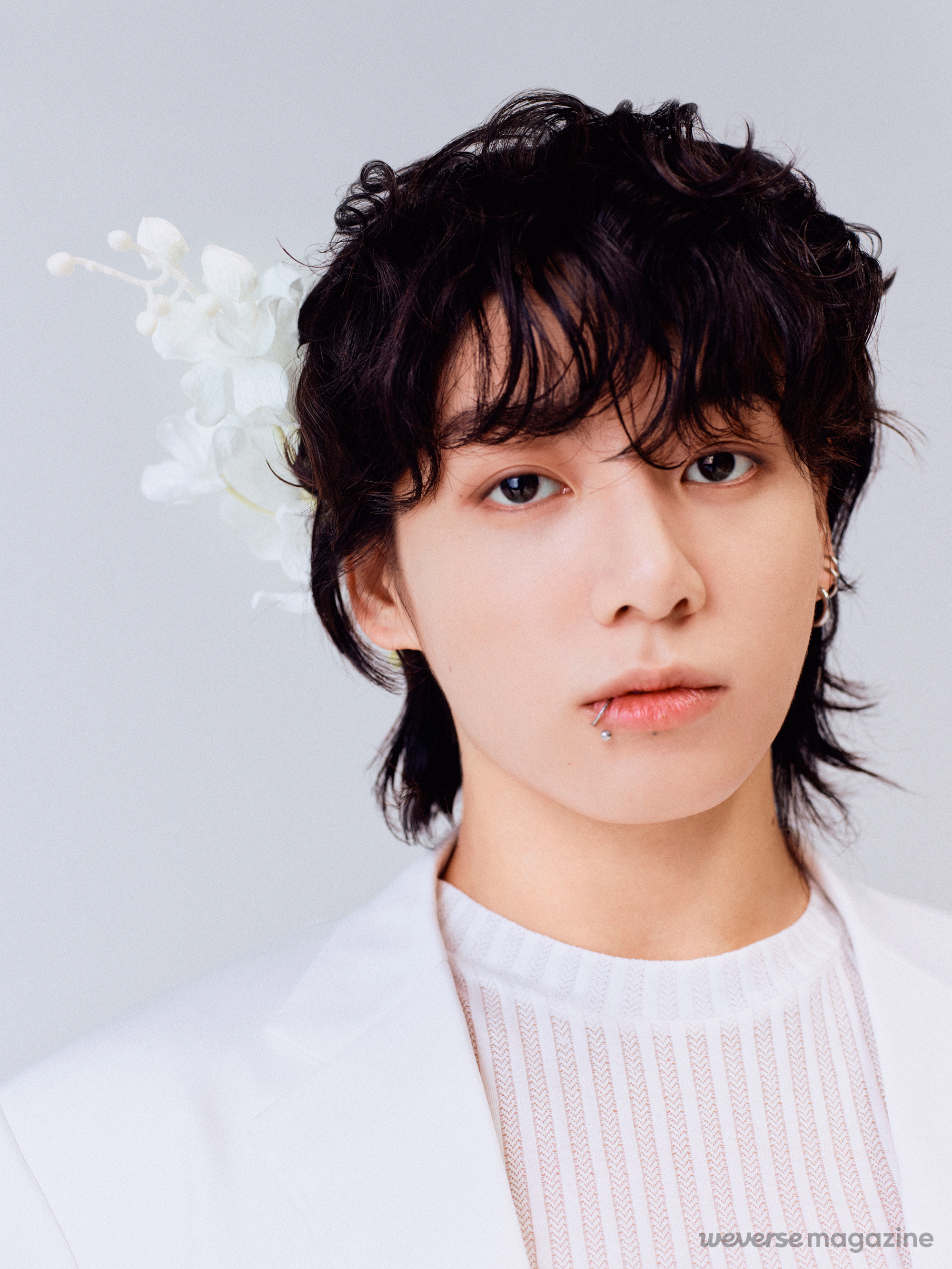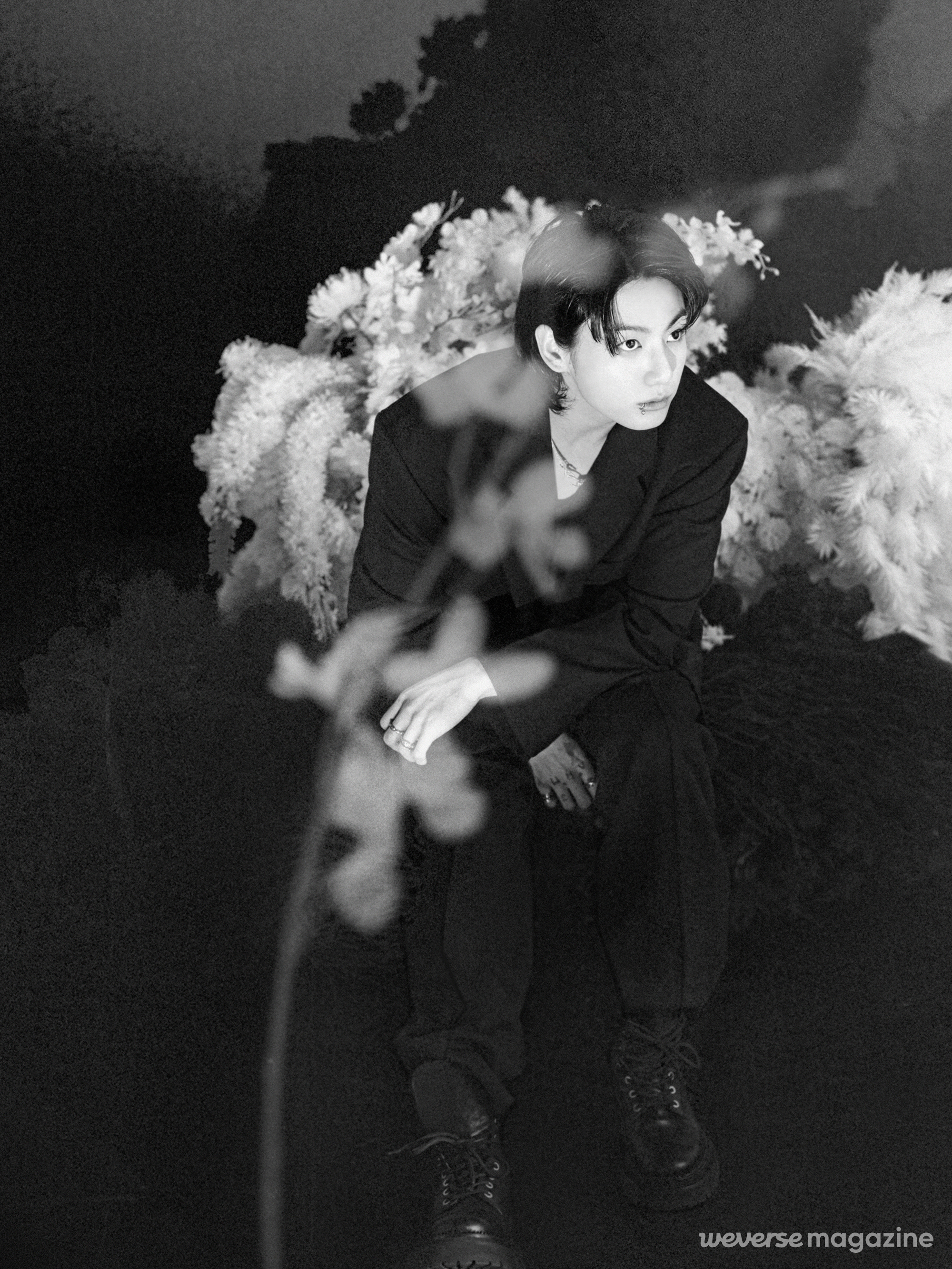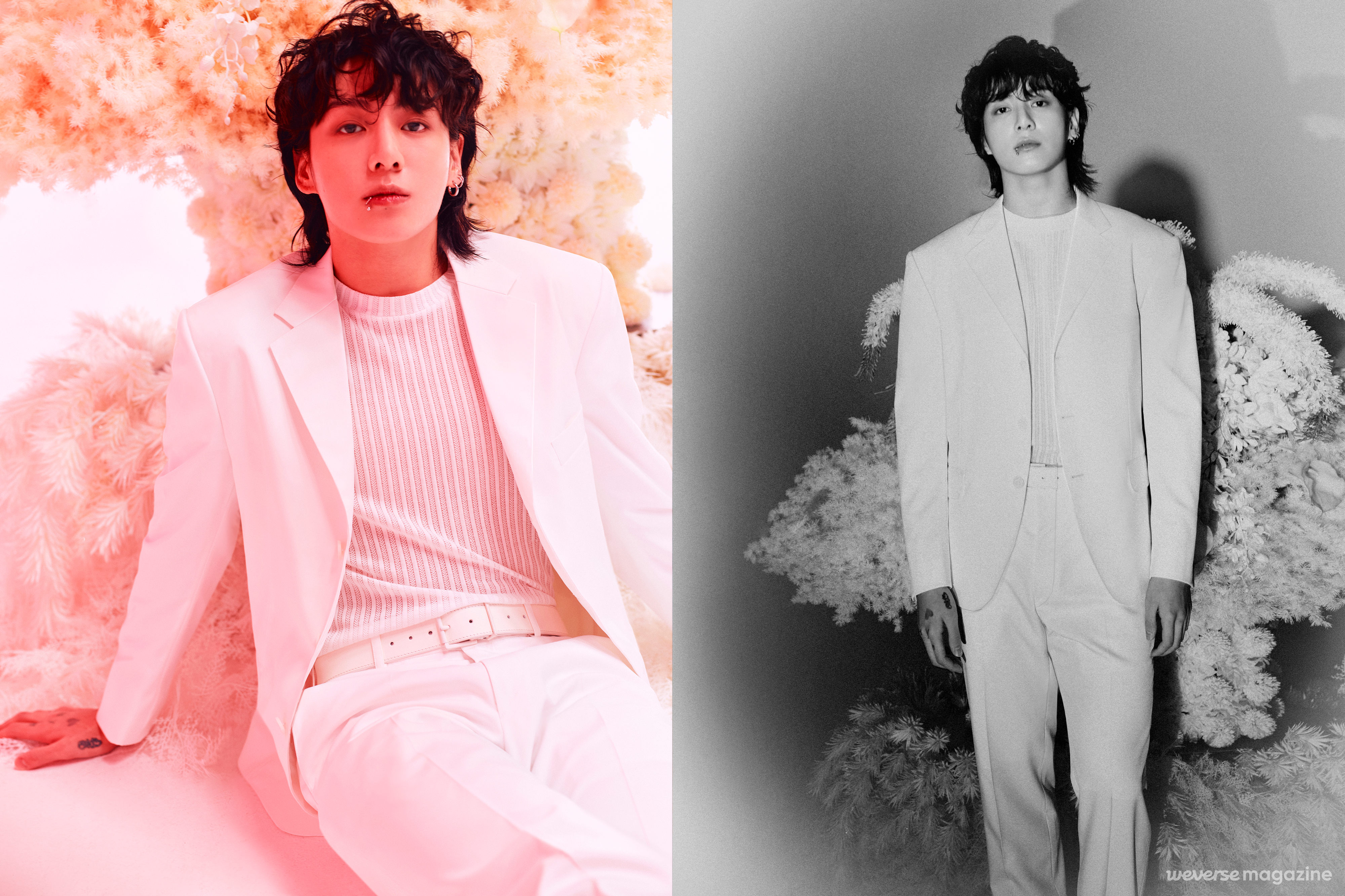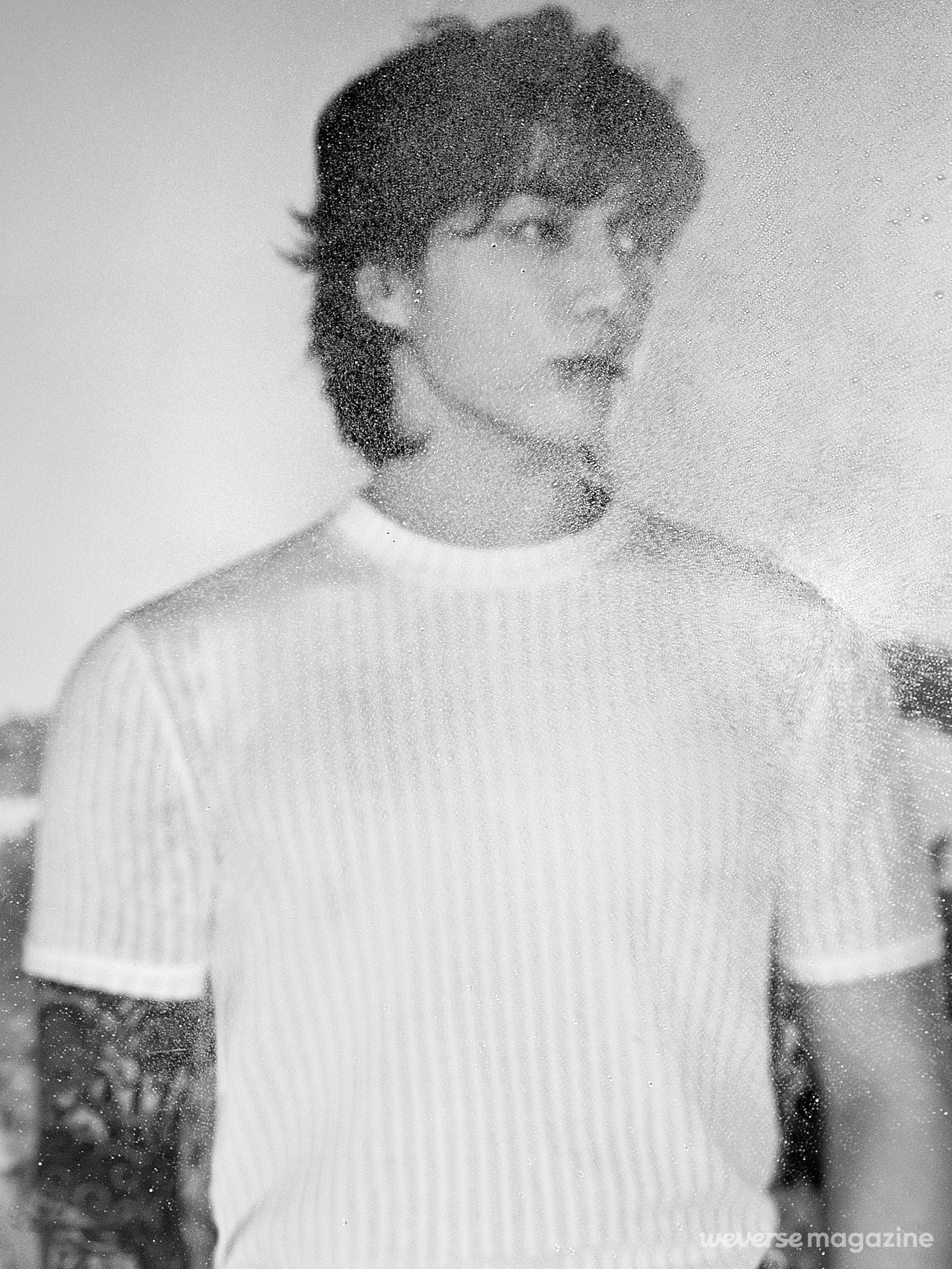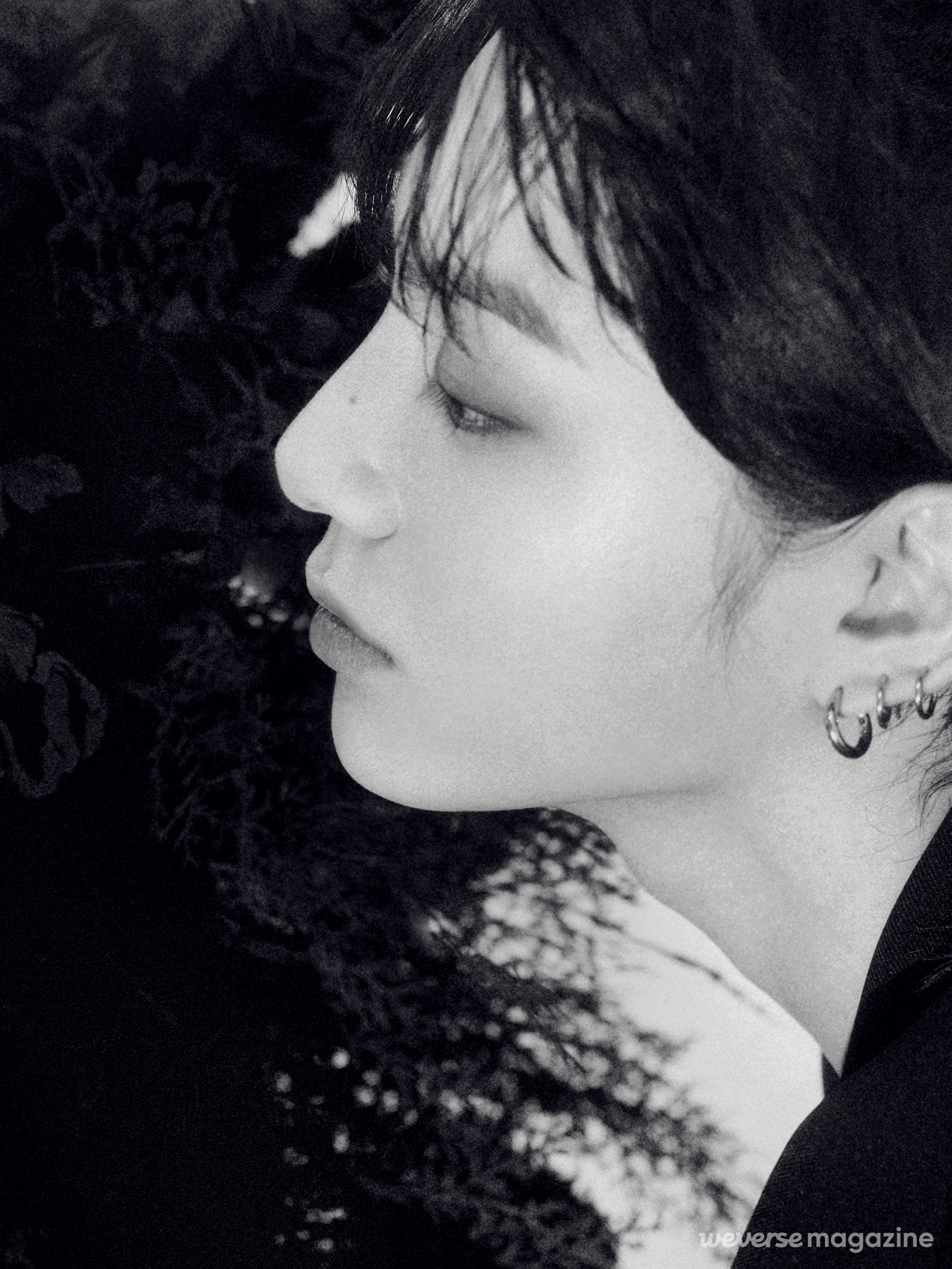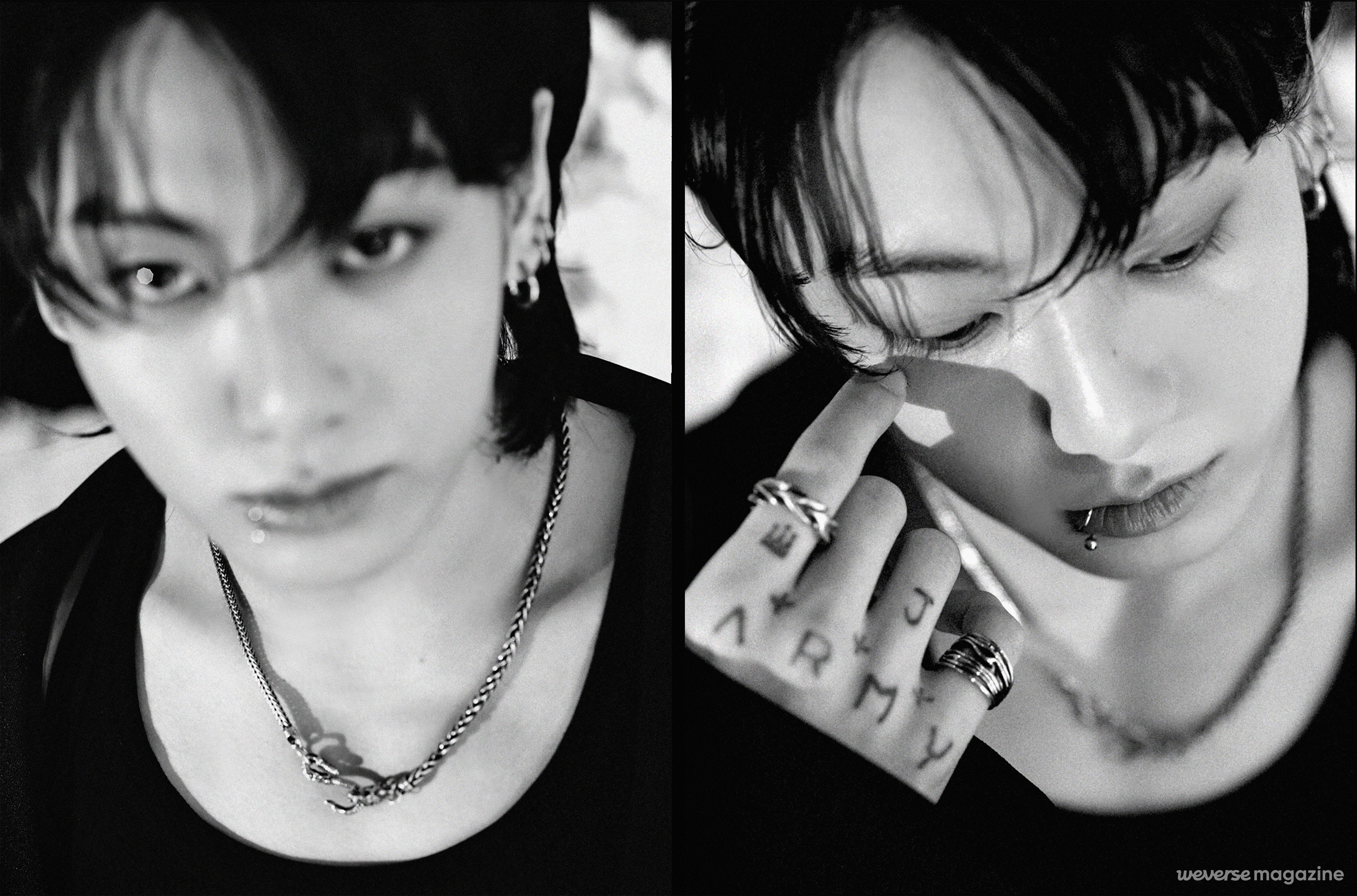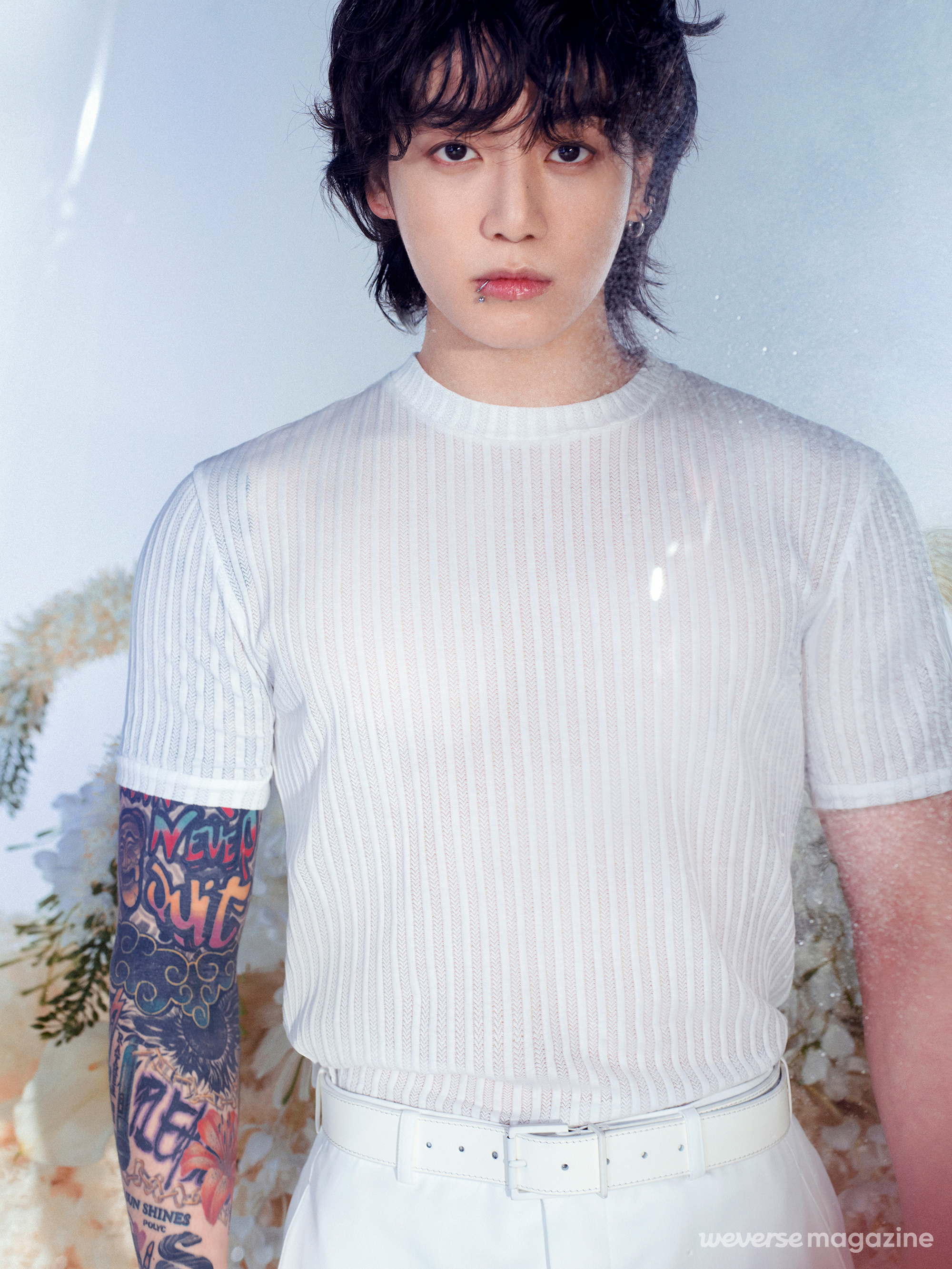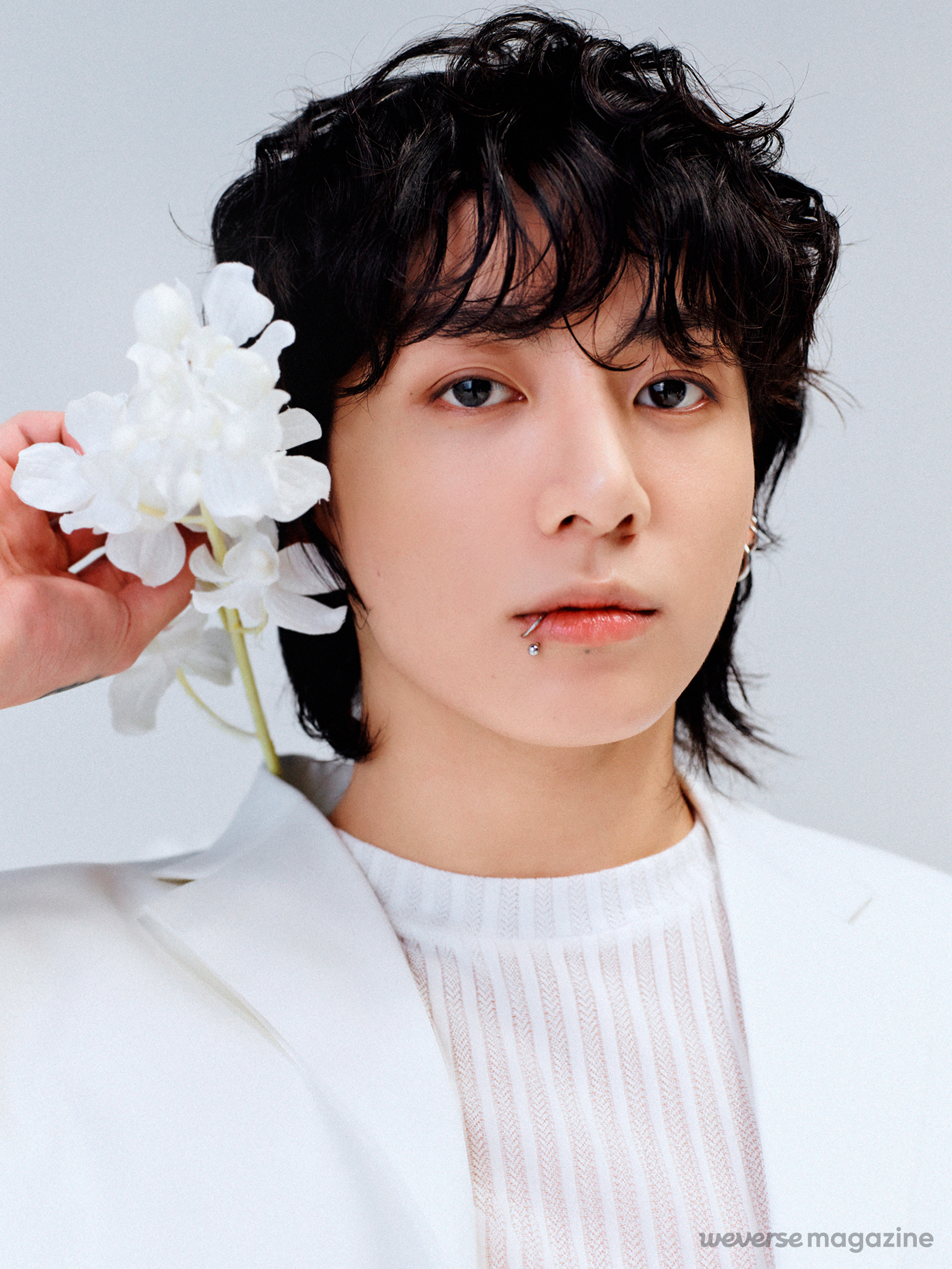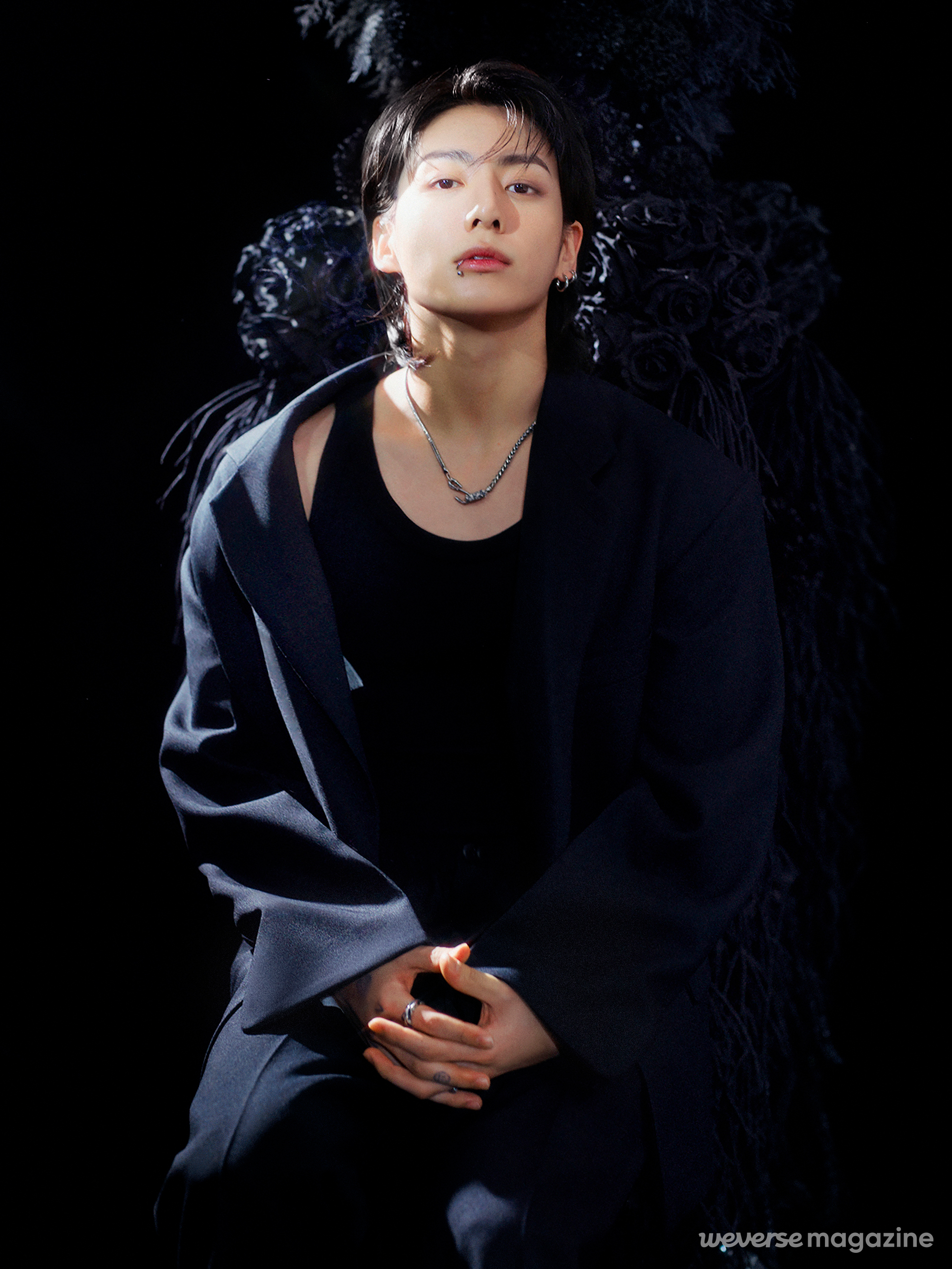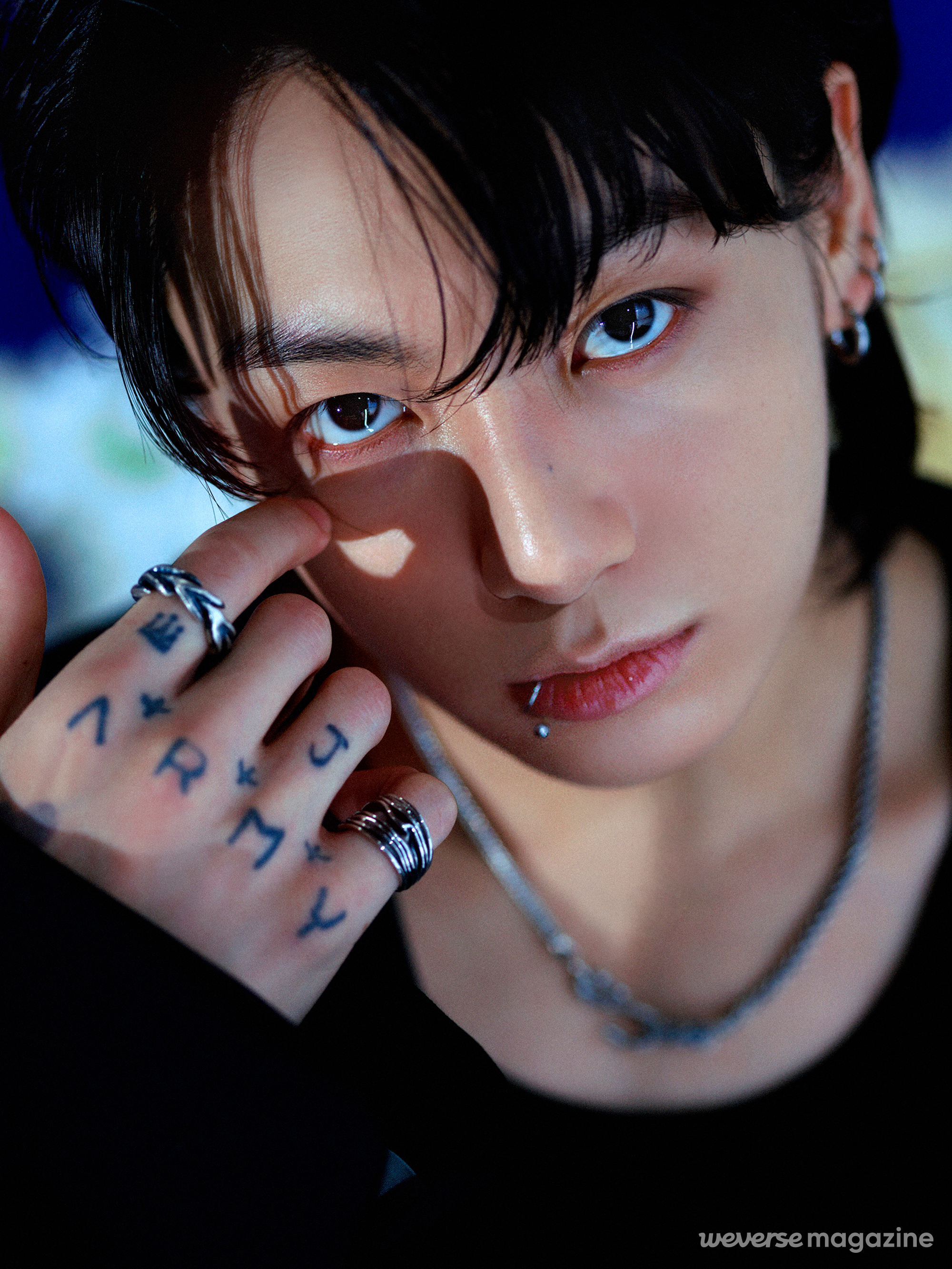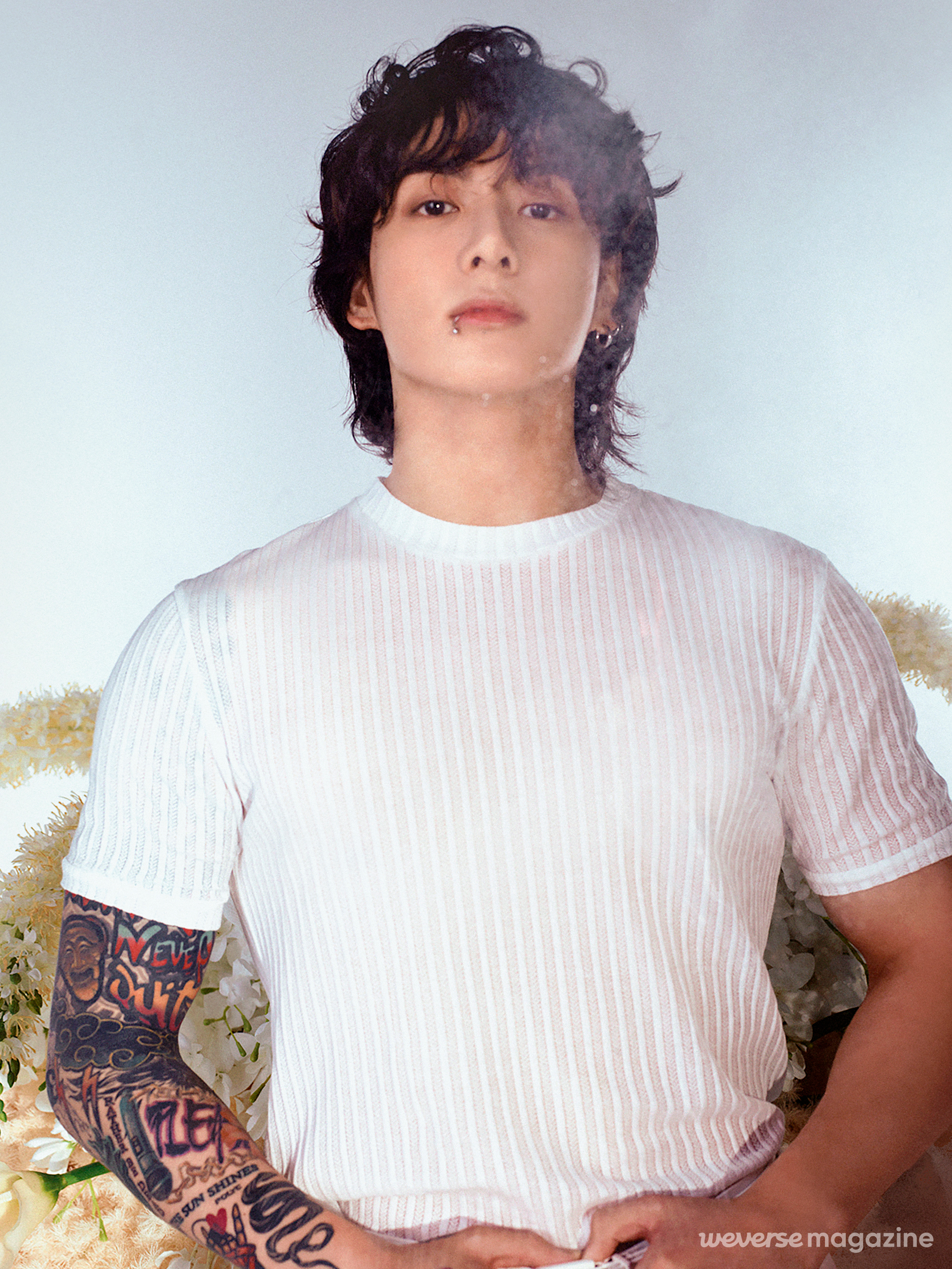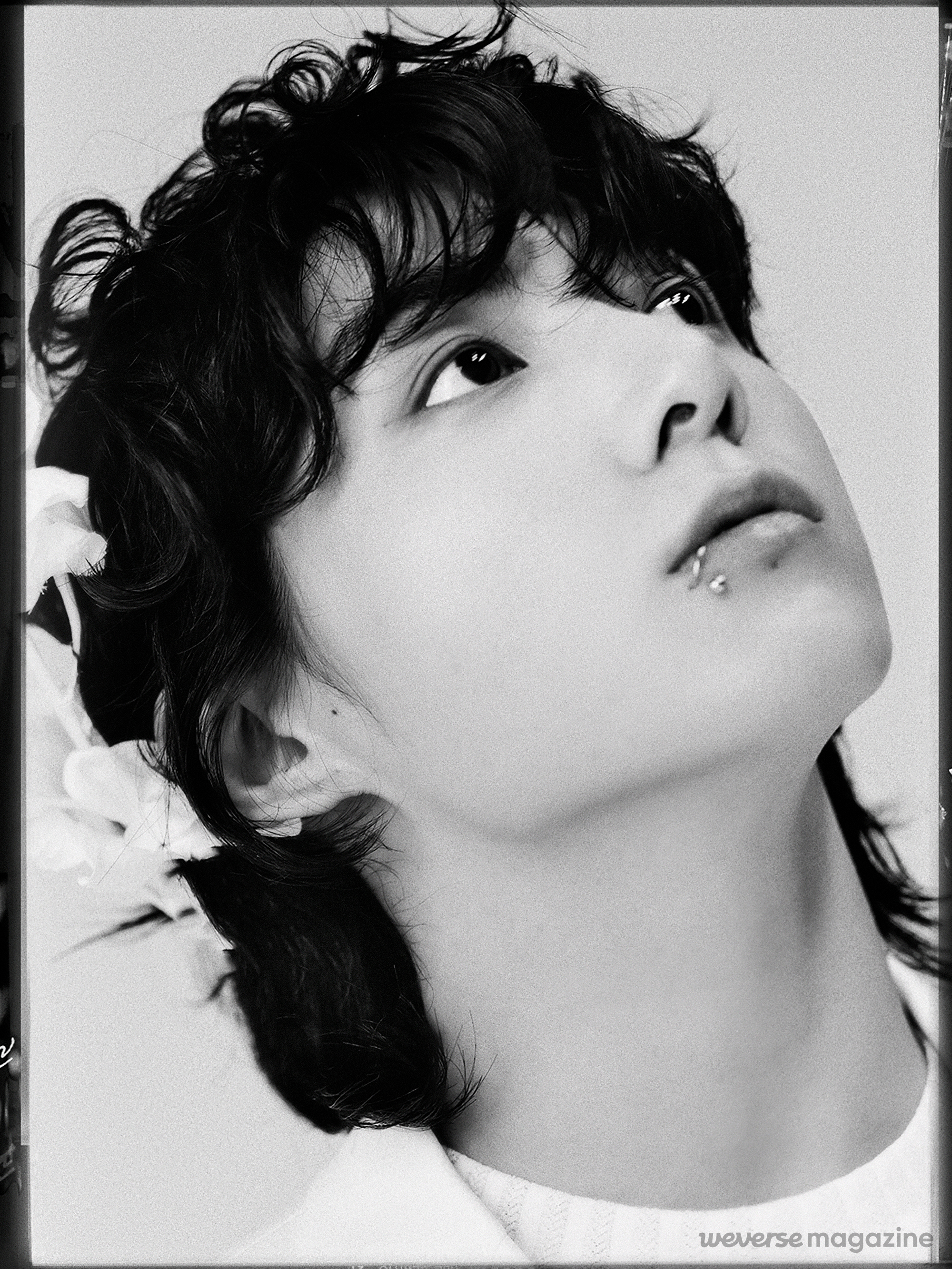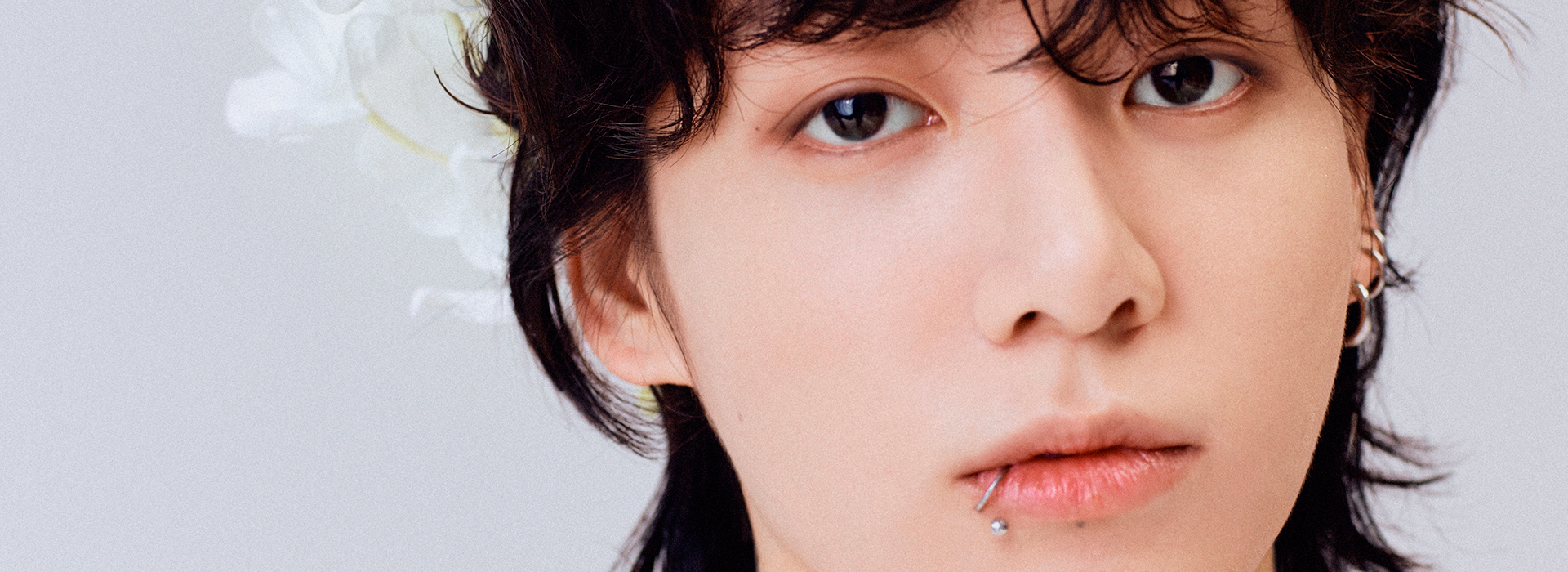
INTERVIEW
Jung Kook: “I’ve been changing a bit”
Jung Kook’s debut solo single “Seven” release interview
2023.07.20
He’s been a member of BTS for 10 years. Now, Jung Kook’s undergoing the biggest changes of his life.
You’ve been doing long Weverse Lives at night a lot lately.
Jung Kook: I used to tell the label before I was going to do a Live and get myself ready, but one time I just fired up my phone and did it. Ever since then, I just turn it on whenever I feel like reaching out.
You even fell asleep in front of the fans one time. (laughs)
Jung Kook: That’s because I’m becoming simpler every day. I don’t give things too much thought. I just, you know, keep it casual and shareabout what I’m up to or what’s happening.
It’s amazing how you’re able to present yourself exactly the way you are, even though you’re literally a member of BTS.
Jung Kook: You know, I meet a lot of different people when I’m working with the group, whether intentionally or not. I used to go home and get some rest after finishing up work, but it’s not like that lately, so I’ve been feeling adrift . I’ve been taking it easy, and now I want to be around other people—like hanging out with the other members or someone else. I want to hear from other people.
It was funny the way you walked a tightrope as you were dropping hints for “Seven (feat. Latto)”, saying that “the company will go crazy” if you said anything about it. You just kept it casual and didn’t go overboard.
Jung Kook: I think I can only be the real me when I’m speaking my mind honestly. I feel like I’m changing in a way. Now I think I should do things the way I want to do them. Because, if I do things right, lots of people will accept that, and then I can be more open about the real me.
I guess you’re getting a feel for making a judgment call about what would be appropriate to do. Maybe that’s your mindset when you’re working, too.
Jung Kook: Right. I was always the youngest one in the group. Now I’m releasing my own solo song. It feels different working by myself too. I think the responsibility that comes from how I interact with other people and the center of my thinking have both changed. There are a lot of decisions I have to make that I can’t just sidestep by saying, “Ah, I don’t know.” I wasn’t usually the first in the group to speak up but now there’s a lot I need to and can do. I think I naturally changed as a result.
There must be times like meetings where the staff all look to you or something.
Jung Kook: Sometimes I feel the pressure in moments like that. But it’s not like I’ve changed completely from how I was. I still end up relying on the staff all the time. (laughs) But I sort of told myself I shouldn’t get too comfortable with things. I want to just trust everything to the staff since they’re all pros at what they do, but there’s still many times where I bring up things I have thoughts on and do my best with everything else the staff puts together. I’m a dancer and a singer—I don’t know about every single aspect of the business. It’s my work though, so I give them some ideas, and then just try to basically stay flexible depending on how the situations looks? (laughs) I don’t expect myself to be able to handle everything from start to finish and tell people what to do, and I wouldn’t want to anyway. I sort of feel like … everyone does what they’re best at and then we allow it all to intersect.
There’s no way keeping everyone on the same page like that can be easy.
Jung Kook: Indeed, indeed. Maybe I need to find a way we can all meet in the middle … I’m not really sure. (laughs)I think it’s about maintaining a balance between giving what you can and taking what you can while properly acknowledging others.
You said something similar on Weverse Live recently: “I’m just going to trust myself and do it even in the future … That might result in failure in the future, but I’m going to trust myself.” It seems like you’re looking to work well with others while still pursing what you want and trusting yourself.
Jung Kook: Right.
Where does trusting your instincts lead you as an artist?
Jung Kook: It’s hazy. I just … I only have one, big goal, and it’s to be a giant pop star. I’m not thinking about what the next concept I pursue is going to be or anything. “Seven” wasn’t something I planned in advance either—Producer Bang Si-hyuk just played it for me, and it was so good, I said, “Oh, I definitely have to do this one.” I figured out what kind of promoting I’d do once I decided to do “Seven.” That’s all instinct too. Everyone’s got it, you know? You just hear the song and say, Whoa … That’s a good one! (laughs) What’s amazing is that it doesn’t matter what genre a song is—if it’s good, it’s good. Of course, it’s possible I release a song just because I like it but it doesn’t get that great of a response, but that’s never happened. I think I’ve been living that way all along. I think now I’m more systematic when it comes to listening to my instincts, whereas my instincts used to come from a place of not knowing anything at all. So I want to do the things I’m drawn to and not overthink it.
Why a giant pop star? You’re already a giant pop star, aren’t you? (laughs)
Jung Kook: No. I don’t see it that way. I guess it’s just my ambition—the ambition to be more appreciated and be even better. In a word: cool. That’s the whole reason I’m doing this. I want to be that kind of pop star someday—I want to be able to really experience that feeling. I hope the day comes that I can look at myself from a third-person perspective and give myself that kind of recognition. I’ll know I’m that kind of pop star once I can do that.
Did performing “Dreamers” for the Qatar World Cup opening ceremony come close to that feeling?
Jung Kook: I think that’s also instinct, in a way. The World Cup was another big opportunity for me. When they gave me the offer, I thought, “There’s no reason for me to turn this down.” I wish I could’ve done better when I performed “Dreamers” though. People liked it, but I still wondered if I could’ve done better.
You said this in a behind-the-scenes video: “I’ve never been 100% satisfied as you all know by now so I’m not satisfied, but still, I didn’t make mistakes and I think it was alright.” It seems like you always practice really hard and then say you’ll just get up on stage and do a good job. (laughs)
Jung Kook: I’m a lot different about that now than I used to be. In the past, if I made a mistake, I felt weighed down by that moment and tortured myself with it, but now if I do something wrong I just tell myself to do better and keep practicing. I started to keep things nice and simple. If you mess up, you just accept it and say, “I make mistakes too.” That’s why I keep trying to do a good job.
What does it mean to you to do a good job on stage?
Jung Kook: I want to be a lot more natural. I don’t like the bad habits I already developed. They’re all I can see. I don’t want my movement to be limited in any way. I want every single movement I make to be different, even if the dance moves are similar, rather than to get every little movement right. I hope I can naturally give off that kind of image.
Would you say that your performance for “Seven” reflects that way of thinking? It’s not so much full of technically challenging moves—more you successfully capturing the atmosphere of the song with cleanmoves.
Jung Kook: I like when things look natural and I wanted to do something a little more relaxed. I made my decisions after seeing a number of different proposals for the choreography. I wanted the performance to feel a little lighter. I wanted to show what makes me different. At the same time, I wanted to add some parts that were a little heavier so that, when people watch the performance, they’d be like, Are you seeing this guy? (laughs)
You described “Seven” as being light. It’s pretty different from BTS’s songs and your other solo songs too. What was it like expressing something different from what you’ve done before?
Jung Kook: It was good. I just embraced the song fully. I didn’t think about it much beyond that. Just do it. (laughs)
Your singing style is a lot different as well. You didn’t make your voice sound hoarse or use vibrato, giving off a sleek pop vibe instead. What made you approach it in that way?
Jung Kook: Before recording anything, you always listen to the demo. I think from there which parts I can get help with, what I should add and which parts have to go, and then record. It’s all about making it my own, and once it sounds good, I think that’s enough. Nothing off-putting; nothing over the top. I naturally end up finding the right mood for every song when I’m recording. When it comes to singing, if there’s a part that’s technically hard, I’ll have trouble thinking how I should sing it, but in the end I always end up making the song my own. And I think I improved a lot in a short time while recording this one. I think I learned more about the details to put in when singing in English. Now I know exactly what I sound like when I use English and I figured out how to sing in it.
Was there a specific reason why you changed it?
Jung Kook: First of all, it was fun. I tried switching up my recording style: I sang the whole thing from start to finish every time I did a take, which was a lot of help. The producer heard my voice on one of the takes and said, “Oh, I think we got it,” and we moved on. I loved it. I didn’t do anything else but sing during that time. If something turned out well we said okay, or else I tried again. And if I needed to do the chorus, I sang it right on the spot. I really liked going through the whole process quickly like that.
It couldn’t have been easy to sing. You had to hit all those high notes perfectly without using too many special techniques. It made me realize how many tools you have at your disposal as a singer. Are you interested in singing in a variety of different ways?
Jung Kook: I certainly wouldn’t say I’m uninterested. I want to use my voice in all kinds of different ways. That’s also why I think it’s a great idea to sing along to other people’s songs. I think it’s a really good idea for me to try something new even if I’m technically using my voice wrong. The wrong way could turn out to be the right way later on. But I can’t lose what makes me unique, so I have to find my own voice. There’s some things I’ll only learn from performing “Seven” on stage. I’ll have to wait for the song to come out and get up on stage and gauge the reaction to feel out what direction I should head in going forward.
There’s a line in the “Seven” lyrics that says, “Weight of the world on your shoulders.” That describes what it’s like to be a member of BTS, I’m sure. How do you feel now that you’re performing alone?
Jung Kook: I feel more pressure now than when I’m with the group. But I think the way I come to terms with that has changed a bit seeing as my personality has changed so much. What made it change like that? Maybe it was just time? (laughs)
What do you think made it change like that?
Jung Kook: I thought about why people love me. It gave me a chance to think about and accept that there must be a reason why they love me so much, even if I don’t know what it is. I could finally acknowledge that they love me. So I asked on Weverse Live: Why do you guys like us?
“Why do you guys cheer for us?” That’s what you said.
Jung Kook: Right. I feel like I’ve changed quite a bit since then. As I started to acknowledge myself, I started to feel like I don’t have to be so timid all the time.
It seems like you’re happy to be loved but at the same time you feel a stronger sense of responsibility.
Jung Kook: That’s the part that’s sort of different. I used to think I just needed to try and do better—that I had to be better to receive recognition. But now it’s like it’s the other way around. I know people embrace me so I want to show those same people a better side of me. I want to work harder and show them something different.
Do the donations you’ve made tie into that at all, like the billion-won donation you made to the Seoul National University Children’s Hospital?
Jung Kook: I feel good about doing that. Really good. My thoughts have been turning to the younger kids these days, so I turned my attention to the children’s hospital thinking it would be good for some new resources and facilities to get built. I’m really happy I could do that.
I think another part of being responsible is taking care of yourself. You’re careful about how much you eat while on Weverse Live. I was impressed how you’re careful about your body even when it’s that time of night for a snack.
Jung Kook: Even if I seem to just do things without much forethought or come across as really simplistic, I usually have serious thoughts going on in my head.
I wondered if that’s why you hang out with the fans on Weverse Live at night. You seem to do everything as you please, but you’re also thinking about everything you have to do, and that’s why you’re able to show that to the fans so easily. You’re happy working out, folding laundry and cooking even when you’re on Weverse Live. (laughs)
Jung Kook: I don’t feel like I’ve just let everything go but I do feel a little freer inside and out. This is me. The real me. This is how I should be living. Just living.
When did you start cooking so much? The things you cooked on Weverse Live even started trending.
Jung Kook: I watch YouTube and make things that look and taste good to eat. I just see something on YouTube and think, I should try that. That became a habit of mine, so now it’s like, What should I have tomorrow? What should I cook? If I cook it and it turns out really good I’ll make it the following day too. I use recipes when I cook, and sometimes I have all the ingredients, but sometimes I don’t. And sometimes I use ingredients that aren’t in the recipe at all. It’s fun to just put in whatever I think might taste good.
Is that also the origin story of the savory hot mayo perilla oil mak-guksu you described on Weverse Live? It’s not the sort of mix of sauces you can easily figure out.
Jung Kook: Well, I think I’ve made it like, three times? I just felt out the sauce. (laughs) I always liked regular old perilla oil mak-guksu: savory, not too salty and just a little oily. And then I thought, What if it was a little spicy? And then, what’s spicy? Buldak. I tried it with just soy sauce and buldak but it was weak somehow. I wanted it to be kind of creamy or thick so I added a bunch of milk and mayo. But, hmm … Something was still missing. So I said, Let’s throw in some buldak mayo. The milk makes it watery, so in goes some egg yolk. Let’s put some minced garlic and onions in to thicken it up a bit, too. I finished making the sauce and it was delicious. For the soy sauce, sometimes I use the regular stuff and other times I try brewed soy sauce, but the regular soy sauce tastes best. Tsuyu’s great when it’s got just a soy sauce base but if you mix in buldak, it has to be regular soy sauce. Next comes the cham sauce. That really played its part well. (laughs)
I tried making it as a late-night meal because of this interview, and adding something spicy to the already sweet and salty mix, along with something tart makes it the kind of thing you can keep on eating without ever growing tired of it. The texture of the noodle was really good, and when I was eating it I thought you must’ve really thought this through thoroughly to come up with it.
Jung Kook: Exactly, exactly. (laughs) I do sometimes just cook quickly, but when I really need to, I do it properly. It takes a really long time to make something properly like that. (laughs)
That means you taste test what you’re making continuously, right? To make sure it’s what you’re aiming for?
Jung Kook: I mean, it should taste just the way I want it to. I think I got it as close to the taste I was going for as I could. Everyone checks the taste of each ingredient as you go along. That way you learn what it’s going to taste like depending on what you put in.
You say, “Let’s just eat,” but there’s nothing simple about it. (laughs)
Jung Kook: Let’s keep it simple, but don’t just wing it. (laughs) It’s not easy. Because I have to make the right amount of sauce for one person. But I’m too lazy to get that specific about it so I just make sure to make enough sauce and don’t worry if there’s anything left over. And anyway, I don’t eat just one helping. I’m always looking for ways like that to make things a little easier.
Does that apply when you work too? It looks like you’re keeping it simple but you’re actually detail-oriented and have a clear vision of what you want.
Jung Kook: I guess you could say that? (laughs)
So how do you feel to really be getting back on stage again? [Note: This interview took place on July 6.]
Jung Kook: I’m excited. It’s a fresh start. But I’m also nervous for the same reason. That’s all I can say for sure because my thing’s not out there in the world yet. I’ll have to gauge things once it’s out. (laughs) I’ll have to give it a go to be sure. It’s that period of time where I wonder how I’ll feel on stage. I get nervous but also really excited.
You’ve said that the idea behind the lyrics you wrote for “My You” was thinking about what would happen if everything were to disappear, or if it were all been a dream. I guess you’ve had the kind of life that would make you think things like that. You’ve become a star worldwide since you debuted 10 years ago and you’re having your solo debut.
Jung Kook: Sometimes it sort of feels like my life is surreal. Sometimes I almost can’t believe it’s real, like, “Is this real life? Am I really doing this?” It was similar when I wrote “My You”: What if none of this is real?
Is that why you were thinking of ARMY? “My You” is directed toward your fans, after all. They’re the ones who are always with you in this life.
Jung Kook: My life would be meaningless without ARMY now. I mean, they’re always there for me. ARMY and I are almost perfectly in sync now. When I’ve been drinking, I never call my mom and dad and say, “I’m home.” (laughs) I do it to ARMY though. That’s just the person I’ve become. It’s such a natural feeling. I just want us to be each other’s special someone—nothing more, nothing less. They’re the ones who support me, so I want to be comfortable showing them who I am, and while we might be physically far apart, I hope we can feel like we’re right next to each other, just like friends.
Do you understand a little better now why they support you, then?
Jung Kook: When I look at myself, I honestly can’t tell. I’m not someone with very high self-esteem. Why am I so popular? Is it just because they like my voice? Or maybe the way I dance? I still can’t figure it out—about why I’m loved by all these people. But, you know, ARMY appreciates me. I might not know why all those people love me but I always remember they appreciate me. So I started to think, What’s the point of all those people appreciating and supporting me if I don’t have confidence? I think that’s why I’ve been changing a bit. Even though I’m still not quite sure …
But you’re giving back because you can see that you’re loved.
Jung Kook: I mean, okay, that’s how it happened.
Credit
글. Myeongseok Kang
인터뷰. Myeongseok Kang
Visual Director. Jeon Yurim
Coordinator. Yoon Haein
Photography. Hyea W. Kang / Assist. UMJISU, Lee Dongchan, Park Jeongheon, Shin Yonguk
Hair. Park Naejoo / Assist. Lee Yurim
Makeup. Kim Dareum / Assist. Kim Seonmin
Stylist. Youngjin Kim / Assist. Yesong Kim
Set Design. HA I I HWA
Artist Management. Kim Subin, An Dasol, Lee Seungbyeong, Lee Jungmin, Lee Hyeonki, Jeong Taejin, Jeong Daeseong, Lee Jusang, Song Jaekeun

Weverse Magazine

Jung Kook:“我好像在自我改变”
Jung Kook solo出道单曲《Seven》发表访谈
Copyright © Weverse Magazine. All rights reserved.
Unauthorized reproduction and distribution prohibited.
Unauthorized reproduction and distribution prohibited.
Read More
